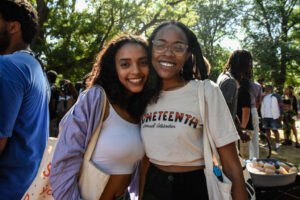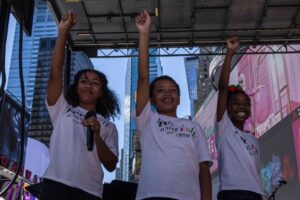On June 19, 1865, in Galveston, Texas, enslaved people in the area were told something that would change their lives, and those of their descendants, forever: They were free.
According to PBS, the news came two-and-a-half years late — slaveowners in Texas did everything they could to stop enslaved people from learning that then-President Abraham Lincoln awarded them their freedom in 1863 with the Emancipation Proclamation. A year after learning of their emancipation, Black Texans gathered for a Fourth of July-inspired celebration, and with that, Juneteenth was born.
In the 19th century, Juneteenth celebrations included readings of the Emancipation Proclamation, stories from former slaves, a prayer service, inspirational speeches, refreshments, games and dances, the Texas State Library and Archives Commission reported. Today, Juneteenth shindigs look a little different. Here’s how five people are celebrating the holiday this year.

Attending annual celebrations
Brittainy Lynn, a creative consultant, grew up celebrating Juneteenth. Her hometown of Abilene, Texas, always went all out for the holiday.
“Those BBQ sandwiches were the best,” she told Blavity of the town’s celebrations at the “Black” park. “I can taste it now just thinking about it.”
This year, she plans on attending Denver’s annual city celebration. She’s never been before, and she said she was surprised to learn that Denver has held “pretty big Juneteenth celebrations even before it became mainstream.”
Supporting Black-owned businesses
Both Stephanie Penn, an entrepreneur, and Mycah Bacchus Maye, an actress and entrepreneur, are planning on supporting Black-owned businesses during the holiday. As businesspeople themselves, they know how impactful buying Black can be.
“Being an entrepreneur myself, I recognize the significance of supporting other Black business owners throughout the year, particularly during Juneteenth celebrations,” Penn told Blavity.
Penn’s fundraising service program, Tee & Honey, is planning on celebrating the holiday, too. They’re selling commemorative Juneteenth T-shirts. When you buy one of their shirts, you have the opportunity to support their initiative of the month or one an organizations they’re fundraising for.
Celebrating Black history
Tamieka Welsh, a social work professor, is looking forward to attending The Lay Out‘s annual Juneteenth day celebration in the park. She also told Blavity she plans to check out “a few events at the Brooklyn Museum” to learn more about the holiday and Black history.
The latter is something she tries to do as often as possible on Juneteenth.
“Sometimes I either celebrate with friends or family members. We either have a cookout or I attend some of the local events in the city that allow me to learn more about the history of Juneteenth,” she said.

Walking the path of our ancestors
Juneteenth has always been a special holiday for Natalie “Naee” Anderson, a film director. Growing up, the Richmond, Virginia-native would walk the historic Richmond Slave Trail with the Elegba Folklore Society, an organization that celebrates African and African American culture. This year, she’s looking forward to revisiting the tradition.
“Since moving back home to [Virginia] recently after my mother was killed by the police in the midst of the pandemic and police brutality, I have been very intentional about celebrating Juneteenth in honoring our ancestors and the [lives] that have been sacrificed at the hands of the system by taking ‘the walk,'” she told Blavity.
Anderson described the annual walk as “a looping hike around 5.5 miles total in which you start at the dock where the slaves where imported and you walk the same trail they had to trek to be sold until you reach the final point of the burial site.”
Anderson said “there are things you see along the trail that commemorate the existence of our lost ones and honor what they may have had to endure to make it across the waters.”
What Juneteenth means to them
Juneteenth means many things to many people. For Maye, the holiday is all about being grateful.
“Juneteenth means living an answered [prayer],” she told Blavity. “It means people who endured and survived for me, my husband, my family and future children to have a life we have today. It reminds me to be grateful.”
Welsh, on the other hand, thinks the holiday is about freedom.
“Juneteenth to me means freedom,” she said. “Juneteenth symbolizes the struggles my ancestors went through and it’s a day I enjoy acknowledging everything that has come before me.”
Lynn said Juneteenth is all about bringing Black folks together, on a day she poignantly said “really should’ve never been.”
“To this day we are still fighting for freedoms that we are owed as citizens of this country,” she said. “As the world begins to celebrate the day, I hope that organizers will uplift Texas AND Black folks in their events.”
There are so many ways to celebrate Juneteenth — as Anderson, Penn, Welsh, Maye and Lynn have proven. Ultimately, the holiday is about freedom and paying homage to the past, present and future of the Black community. Whatever makes you feel free and connected to where you came from is the best way to celebrate Juneteenth this year and for years to come.
